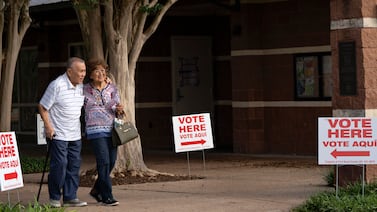Amid a GOP campaign to pressure county supervisors across Arizona not to certify their elections, two counties have postponed their vote until the eleventh hour, raising questions about what happens if they fail to meet their deadline to finalize results.
There’s a simple answer, according to election attorneys in the state: If counties do not certify their election by the Monday deadline imposed by state law, courts will force them to do so.
But court proceedings could potentially cause delays, interfering with the tight timeline for two statewide recounts, and would force taxpayers to pay legal costs for a case where the outcome essentially isn’t in doubt.
“They will cost the county a lot of money and embarrassment and it will do nothing,” said elections law attorney Jim Barton.
The resistance comes from officials in two mostly rural and heavily Republican corners of the state, Cochise County in the southeast and Mohave County in the northwest, though supervisors cited different reasons. Their delay in certifying leaves a trove of predominantly GOP votes uncertified for now.
Cochise supervisors’ decision to put off certification appears to have been at least partly influenced by people who live outside those counties, including some activists involved in a failed movement to throw out 2020 election results. Those activists have revived claims they made unsuccessfully in 2020 —that vote-counting machines weren’t properly certified — even though the Arizona Supreme Court rejected that claim in September.
On Friday, Cochise County supervisors voted to postpone their vote until Nov. 28, after hours of coordinated public comments that appeared to have been orchestrated by three individuals who made similar claims in 2020: Phoenix resident Paul Rice, Maricopa city resident Daniel Wood, and Brian Steiner, who did not tell the board where he lives. Supervisor Peggy Judd said she wanted to do more research on their claims about vote-counting machines before finalizing the results, adding that she has a hard time trusting “any computer.”
“I don’t even trust my cell phone, and it’s a flip phone, and I don’t trust it. It doesn’t always give me results, it’s not always there for me. So, it’s a difficult thing,” she said.
On Monday, the Mohave County Board of Supervisors, all Republicans, also voted to delay certifying the election results until Nov. 28. But in that case, there was no impassioned public comment. Two supervisors, in fact, said the delay was simply an effort to make a political statement. Supervisor Hildy Angius, a Republican, even promised the county would certify before the deadline.
“If we don’t certify today we are just making basically a statement of solidarity,” she said, implying that she supported the overall effort not to certify the election.
GOP leaders such as former Trump adviser Steve Bannon and Turning Point founder Charlie Kirk have been urging county leaders not to certify election results, asserting that Maricopa County’s election was riddled with so many problems that the statewide results should not be certified.
Supervisors in both Cochise and Mohave counties said their elections were well run. But delaying the certification is a way to prove to their “rural, red” constituency that they did everything they could to stop statewide certification, said Republican political consultant Chuck Coughlin, CEO of consulting firm HighGround. The effort stems from 2020 election denialism, he said, that is “hard to eradicate in one cycle.”
If the counties don’t certify on time, the secretary of state will “use all available legal remedies to compel compliance with Arizona law,” state Elections Director Kori Lorick said in a statement.
Six counties are now all scheduled to certify results on Monday. That includes Maricopa County, where county officials are currently preparing an answer to a demand for information and documents from the attorney general’s office about Election Day problems. Supervisors Chairman Bill Gates said in a statement Monday that county officials would answer the questions transparently and would certify the election results on time.
“There will be no delays or games,” he wrote. “We will canvass in accordance with state law.”
No choice but to certify
Several election law attorneys told Votebeat that the supervisors do not have a real choice. State law requires county supervisors to certify, or canvass, their counties’ results within 20 days of the election. The only exception in the law is that, if there are any missing returns among polling place results, “the canvass shall be postponed from day to day until all the returns are received or until six postponements have been had.”
The secretary of state, in turn, is required to certify the statewide election on Dec. 5.
County supervisors have a non-discretionary duty to certify the results, and have “no authority to change vote totals or reject the election results,” according to the Election Procedures Manual.
The certification of results is what is known as a “ministerial act,” according to Barton and lawyer Tom Ryan. If supervisors vote against certifying, the secretary of state, a voter, candidate or voting rights group will quickly file a lawsuit to force them, Barton said, and the court is unlikely to allow it.
“They will be hit with a writ of mandamus so fast their head will spin,” Ryan said.
For her part, Lorick sent a letter to Cochise County supervisors on Monday warning them that “bad faith attempts to derail Arizona’s democracy will not go unaddressed.”
Barton and Ryan said that they couldn’t think of a reason why a court would not demand certification in this case.
Barton said voters should see the supervisors’ delays as “using their vote as a game in this political theater.”
Ryan pointed out that the supervisors are taking a political risk, considering they represent Republican-heavy constituents who cast ballots for Republican candidates and want to see those votes counted.
“They are screwing over the statewide Republican candidates,” Ryan said. “That makes no sense whatsoever.”
Coordinated effort in Cochise County to block certification
While some Cochise County residents have told the board they have questions about their election, the resistance supervisors are citing appears to be organized by Rice, Wood, and Steiner. Others who had signed up to speak at the supervisors meeting instead gave their allotted time to those three.
Their argument is the same as in 2020 — that the testing lab that certified the county’s vote-counting machines, SLI Compliance, was not properly accredited by the U.S. Election Assistance Commission.
While it is true that the company’s accreditation had not been renewed for years, under federal rules, it remains accredited anyway as long as it reapplied in a timely manner. Nonetheless, activists continue to assert that the EAC’s failure to re-issue the accreditation on time means the machines should not be used, even though a court has already rejected their argument. Lorick also sent supervisors a letter dated Monday from Mark Robbins, the interim executive director of the U.S. EAC, who confirmed that the version of the vote-counting machines that the county uses were certified by the commission on May 3, 2019.
The Cochise supervisors who are now questioning whether to certify — Tom Crosby and Peggy Judd — are the same Republicans who attracted national attention over the past few months as they unsuccessfully attempted to force through a full hand count of ballots cast in the midterm election.
A court shut down the effort earlier this month, and the Arizona Supreme Court declined to review the case. Undeterred, Crosby and Judd then filed a separate lawsuit against county Elections Director Lisa Marra, asking the court to order her to expand the county’s statutorily-required post-election hand-count audit. They then abruptly withdrew the lawsuit.
Marra told the supervisors on Friday that the election was fair and accurate, with no serious complaints. Audits before and after the election verified that the vote-counting machines tallied votes accurately, she said. About 47,284 voters cast ballots in the election, a turnout of 61.1%.
It’s unclear when Crosby and Judd began considering delaying certification, but Judd reached out to the secretary of state’s office with questions at 8 p.m. Thursday, the night before the supervisors were set to vote on certification, according to emails provided by the secretary of state’s office.
“It states on your website that we can request actual certificates for our machines, proving they have currently been certified according to statute and the HAVA,” Judd wrote in the initial email. “Please send those that Cochise county uses immediately. I hope to have them by 3 pm ... Friday.”
Lorick replied at 9:48 a.m. Friday with the state and federal certificates, along with correspondence the EAC sent to counties when faced with questions about the accreditation of companies that certify voting machines.
“Wow,” Judd wrote back at 2:18 p.m., less than two hours before the supervisors’ 4 p.m. meeting. “That is a lot!” She then asked more questions.
Lorick wrote back at 3:26 p.m. with answers, also sending the court order dismissing the 2021 lawsuit from Rice, Wood, and Steiner.
At the meeting Friday, Wood told the supervisors that his claims about the vote-counting machines meant the election was “unlawful.”
“Don’t sign off on this,” he said. “Send it to the legislative branch. Let them deal with this so they can call a special election and we can do it without these unlawful machines, and we can do it with hand counts which has been done for over 200 years.”
Lorick also spoke, telling the supervisors that the machines were properly certified through an accredited company under state and federal law.
But Judd still said that it was “alarming that there was something going on.”
“We need to make sure we have drilled down to the lowest level on this,” Judd said.
She and Crosby voted to table accepting the election results “until we have such evidence about the lawful certification and accreditation by a laboratory is presented and confirmed by persons with expertise in this field.”
It’s unclear whose expertise Crosby and Judd would accept, but Crosby suggested Lorick wasn’t it. While the state’s elections director said SLI Compliance was properly accredited, Crosby acknowledged, “other people say they are not.”
“Is she of higher and greater importance than our citizens?” he said. “I think not.”
“Well, she is the elections director for the state of Arizona,” Supervisor Ann English, the only Democrat on the three-member board, pointed out.
“This has nothing to do with Mohave County”
In Mohave County, Anguis praised the county’s elections director, Allen Tempert, for a well-run election, saying she wishes that he could give Maricopa County officials “some lessons on how it was done.”
Tempert told the board that there is no thing as a perfect election, but this one was “very, very successful.” About 82,800 voters cast ballots in the election, a turnout of about 56.3%.
Anguis said that if they didn’t vote to certify, “this has nothing to do with Mohave County, because you did an awesome job.”
County GOP Chairwoman Jeanne Kentch, who is also the county assessor, told the board to certify the election “so we don’t risk the statutory recount that could help our Republican attorney general candidate Abe Hamadeh.” Hamadeh lost the election to Democratic candidate Kris Mayes by 510 votes and the race, along with the state superintendent of public instruction’s race, will trigger an automatic recount under state law once results are certified.
At the same time, Kentch said she believes “Mohave County voters have been disenfranchised, votes have been diluted … due to the mismanagement and dysfunction” in Maricopa County.
Supervisor Buster Johnson asked his colleagues if they were just making a political statement and ultimately were going to “do what the agenda said” by certifying the election.
“It is purely a political statement,” Supervisors Chairman Ron Gould answered him, “but it is the only way we can make this statement.”
Supervisor Jean Bishop called this “ludicrous.”
“We aren’t Maricopa County, we are Mohave County,” she said. “Our vote is solid. Our canvass is going to be solid, whether it’s Monday or today. We are good.”
Republican-heavy counties Graham, La Paz, Pinal, and Yuma certified their results on Monday. And while a rumor spread on social media sites on Monday suggesting Gila County would delay certifying their results, the county had already done so in a unanimous vote last Friday.
“People need to feel confident in the election process,” said Supervisors Chairman Tim Humphrey. “And I think they can in Gila County.”
Coughlin, the political consultant, said he believes the other counties will move forward with certification after this “political theater.”
He believes this is political posturing for the Republican supervisors who want to remain the preferred candidate for the far-right, so they don’t face primary challengers during their next election.
“This is a dance to appease those constituencies, to prevent people from getting to the right of them in the next election and to protect them in the primary,” Coughlin said.
Correction, Nov. 23: This article originally overstated the number of ballots cast in Cochise County for the general election, mistakenly citing the number of registered voters.
Jen Fifield is a reporter for Votebeat based in Arizona. Contact Jen at jfifield@votebeat.org.






